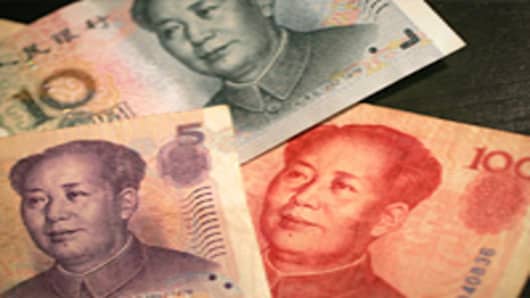Since a limited offshore market in the Chinese currency was established in Hong Kong last year, volumes have gone from strength to strength. This week’s media has been carrying reports about the Chinese authorities selecting where the next offshore trading centre might be, perhaps in Singapore, New York or London.
Time zone and global reach probably suggest the City, but there is much more to get excited about than debating merely which jurisdiction of the world’s financial system will benefit from trading the currency.
This is the first step in a long journey, but one which at the end will have transformed the current structure of the global economy. Put simply, we will have another reserve currency, and governments and economies would have had to change the way they manage their finances.
We are still a long way from there. But just being able to trade the renminbi, even if it is offshore, is a sign that we are on the way to a new beginning. An alternative reserve currency will have significant impact on many aspects of global commerce. But is it a good thing?
If we accept (and not everyone does) that one of the primary causes of the financial crash of 2007-2009 was the global imbalances in trade and reserves built up over the previous 10 years, then having a freely traded and floating yuan will go some way to correcting these imbalances.
Put simply, the Asian and oil-exporting countries have built up trillions of dollarsin, well, dollars, and these funds have been recycled back into the Western banking system. In a reprise of the Latin American sovereign debt crisis of the early 1980s, this translated into the US sub-prime crisis of 2007.
Banks awash with cash need to find somewhere to deploy that cash and all that plentiful liquidity means that cash is cheap – witness the tight credit spreads of 2002-2007. This surplus liquidity will reduce once more borrowers decide to issue liabilities in renminbi and more investors decide to hold these assets.
Up to now Western economies led by the US have dined out on something of a free lunch, because the cash-surplus countries need US dollar assets to park their excess funds in. Would the US be able to run up quite so large a budget deficit if the dollar was not the reserve currency, and indeed the currency in which many tradable goods and services are priced and dealt in?
Even EU countries benefitted from the trade surplus of the Asian and exporting countries, as the latter looked to diversify away from the “greenback” and into euro sovereign bonds.
How does a tradable “redback” help? Depending on how one defines “help”, it will certainly correct this surplus East / deficit West imbalance – it will have to. More companies will look to issue debt in renminbi, more commodities will be priced in it, and more sovereign authorities will park their surplus cash in bonds denominated in it.
This is quite possibly anathema to the Chinese government, which would be loath to suffer from things like imported inflation and boom-bust liquidity crises, which are apt to arise when a country loses control of its capital account. But it is inevitable, and possibly arriving sooner than the 30-40 years that some commentators have suggested.
One could say this is progress. Issues like productivity, unemployment and perpetual budget deficits will have to be addressed seriously once Western economies no longer benefit from export-led governments buying their bonds (these countries will shift much of their currency reserves into renminbi bonds).
The balance of economic power, if not of political power, will certainly change. The benefits of that are debatable. But a rebalancing of the liquidity reserves of West versus East would at least have the benefit of making bank crashes like the one in 2008 less common.
_________________________
The author is Professor Moorad Choudhry, Head of Business Treasury, Global Banking & Markets, Royal Bank of Scotland.
The views in this article represent those of Moorad Choudhry as a private individual, and do not represent the views of Royal Bank of Scotland or of Moorad Choudhry as an employee of Royal Bank of Scotland


